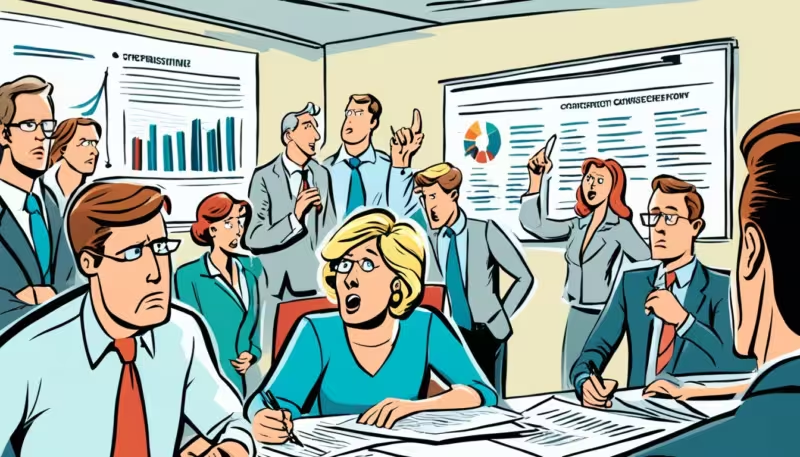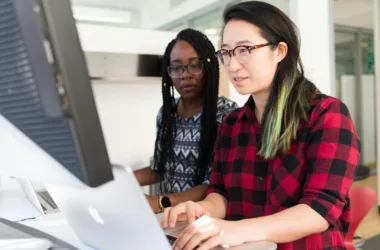Have you ever thought about why some job applicants do well in group interviews and others don’t? Group interviews are becoming more common. This is because businesses are looking to save time. This article will help you prepare for group and panel interviews. We’ll focus on how to communicate well and work as a team.
Recognizing how these interviews work can make you more confident. It can also make you more memorable to interviewers. Getting ready in the right way is key to doing well.
What is a Panel Interview?
A panel interview happens when a job candidate meets with several interviewers at once. This group usually includes people like bosses, team leaders, and HR folks. They work together to get a full view of what the candidate brings to the table.
This kind of interview aims to be efficient and asks a wide array of questions. It is common in fields like healthcare, government, and big companies. A big plus is that it saves time. A team can see many candidates quickly, unlike the one-on-one style.
The setup with several interviewers helps make the hiring process more fair. It cuts down on personal bias. It looks at how interviewees deal with bosses. This helps figure out how they might act at work.
Though facing several interviewers might seem scary, it’s an opportunity. It shows how well candidates respond to tough questions and pressure. Panel interviews are key to finding out if someone will do well in a company by seeing how they react to different people’s views.
Understanding the Purpose of Group Interviews
Group interviews are now common in many companies’ hiring processes. They allow employers to meet with multiple candidates at once. This method is perfect for quickly filling many positions, particularly in new companies.
In these interviews, how candidates work together and communicate is observed. This shows who can solve problems and work well with others. Such skills are vital for jobs needing strong social abilities.
Aside from saving time, group interviews can help save money by reducing hiring mistakes. They offer a peek into how applicants interact in group situations. While some may stand out, others might struggle, impacting their success.
However, these interviews might not be fair to all. They can favor those who are outgoing over those who are quietly skilled. Employers need to understand this to make the best use of group interviews. The main aim is to find the right people efficiently.
Preparing for a Panel Interview
Getting ready for a panel interview is key to leaving a strong mark. It’s different from a one-on-one interview because there are more people to impress. Doing thorough research sets you apart and boosts your confidence.
Research the Company and the Panel Members
Start by really getting to know the company. Learn what they stand for, their goals, and their latest news. This makes it easier to match your answers to what they’re looking for. It’s also critical to know who’ll be interviewing you. Understand the role each panel member plays in the company.
Use social media and the web to learn about their professional lives and interests. This helps you speak directly to their concerns during the interview.
Understand the Interview Structure
It’s also important to know how the interview will go. Panel interviews can be long, lasting up to 90 minutes or so. Figure out if you’ll just be answering questions or if you also need to present something. This knowledge lets you plan your time and answers wisely.
Make sure to engage with each person on the panel, not just the boss. This approach creates a friendly atmosphere. It also shows you value everyone’s input.
Key Differences Between Group and Panel Interviews
Group and panel interviews differ greatly, affecting how a candidate prepares and responds. It’s key for every applicant to understand these formats well. They aim to succeed in their interview experiences.
Group interviews involve many applicants at the same time. They let companies see how well you communicate and act with others in a competitive environment. It shows how candidates work with others and react under stress. This can reveal traits not seen in one-on-one interviews.
Panel interviews, on the other hand, have one candidate meet several interviewers at once. This is common in academic settings. The candidate’s fit for the role is judged by everyone on the panel. Each interviewer adds their own viewpoint, leading to a thorough assessment.
In a group interview, you might find yourself in role-play situations or handling practical tasks. These show how well you work in a team and solve problems together. Yet, this can also cause tension among applicants. It underscores the need for a prepared interview team to manage well.
Panel interviews dig deeper, focusing on your professional behavior, critical thinking, and how you talk to others. You must answer questions from various interviewers thoughtfully. Each panel member may ask something related to their field. This demands thoughtful engagement from the candidate.
Choosing between group and panel interviews depends on the organization’s needs. Knowing the pros and cons of each helps recruiters design the best hiring process. This careful choice improves the hiring experience. It ensures the selection of the most suitable person for the job.
Common Types of Questions in Group Interviews
Group interviews often focus on different types of questions. They help interviewers understand a candidate’s history and how they act professionally. These queries test a person’s team skills and if they’re right for the job.
Behavioral Questions
In group interviews, behavioral questions are key. They explore how someone dealt with specific past events. For example, they might ask, “Describe a problem you solved.”
To answer well, use real-life examples to show your problem-solving and how flexible you are. The STAR method (Situation, Task, Action, Result) is a good way to structure your answer. It makes your response clearer and more detailed.
Professional Demeanor Questions
Questions on professional demeanor test how you see yourself and relate to others. “How would your peers describe you?” is a typical question. It makes you think about your team and communication abilities. Accurate answers help interviewers understand if you’ll mesh with the company’s vibe. They check if you can manage team tensions. Showing you know yourself well and are confident can make you memorable.
Effective Communication Strategies for Panel Interviews
Doing well in panel interviews means communicating effectively. You need to connect with each member of the panel. This involves using smart strategies. Connecting well with each interviewer shows your social skills, which are key to doing well.
Making Eye Contact with Each Panel Member
Looking each interviewer in the eye builds trust. It shows you’re engaged and sure of yourself. Such an act displays respect and shows you’re listening, key tips for panel interviews. Make sure to address every person, showing that you value their questions.
Engaging Everyone in the Conversation
It’s important to keep all interviewers engaged. Take breaks to listen well. Your answers should reflect what each panelist says. At the end, ask them questions. This shows you value their viewpoints and adds depth to the conversation. Effective speaking makes you memorable to the interviewers.
Preparation Tips for Success in Group Interviews
Group interviews can be tricky, but confidence and strategy are key. Practicing and improving your presentation skills will help a lot. Here are several tips to get yourself ready and stand out.
Practice with Friends or Family
Mock interviews with loved ones are a great way to prepare. They help you get used to answering questions in front of people. This type of practice boosts your speaking skills. It also lets your personality shine, which is important because most employers value good soft skills.
Mastering Your Presentation Materials
Getting ready for a presentation? Make sure it fits the company’s mission. Keep it clear and to the point to engage your audience. Practice your presentation and get feedback to improve. Show you really care about the company, as this impresses 60% of employers. Also, talk about projects you’ve done that show your skills and creativity. With good preparation and a compelling presentation, you can really boost your chances.
Dealing with Anxiety in Group Interviews
It’s normal to feel nervous before group interviews. You’re not alone in feeling anxious when competing with others. Recognizing your feelings is key to handling them. By acknowledging your emotions, you can turn your anxiety into something useful.
Acknowledging Your Emotions
Using deep breathing and rehearsing mentally can really help. These methods lower stress and get you emotionally ready. Think of the interview as a two-way conversation. This changes the focus and boosts your calm and confidence.
Try to get to the place 15-30 minutes early. This gives you time to gather your thoughts. It’s important to know about the company and understand common questions. Preparing answers, like how to introduce yourself, reduces social anxiety when facing the group.
- Remember, it’s okay to feel anxious about interviews.
- Deep breathing can calm you down.
- Learn everything you can about the company and people interviewing you.
- Think of good questions to ask them.
- Practice by doing mock interviews to gain confidence.
Taking these steps eases stress and makes it easier to speak clearly in your interview. By thoughtfully dealing with your anxiety, you’ll do better in group settings.
Next Steps After the Interview
Completing a panel interview is a big step in getting the job. It’s important to be proactive after this step. Sending a follow-up message can really help your chances.
Following Up with Panel Members
Sending a thank-you note shows you’re grateful and excited about the job. It’s best to wait a bit before you follow up. If they said they’d get back to you in a week, wait 10 days to follow up. For a two-week timeline, wait about 15-20 days. Try not to follow up more than two or three times. When you do, it’s smart to talk about things that show you’re a good fit for the job.
Self-Assessment and Improvement
After an interview, thinking about how you did is very important. It helps you figure out what you’re good at and what you can do better. Many people go over their notes before their interview. This can help you do better. Looking back at how you answered questions can give you tips for next time. You might want to write down what you learn to keep getting better.
Conclusion
Preparing well is key to doing well in group and panel interviews. It’s important to know the differences between these types. Group interviews let employers look at many people at once.
Knowing what to expect and who will be there helps. It lets you show off your best skills.
Being good at talking to everyone, including looking them in the eye, really matters. Learning tips and practicing answers builds your confidence. It helps you deal with tough moments too.
The way to ace a group interview is to be ready, join in, and keep in touch afterward. See it as a chance to stand out and show you’re the right choice. With these tips, you’re ready for any group or panel interview that comes your way.






